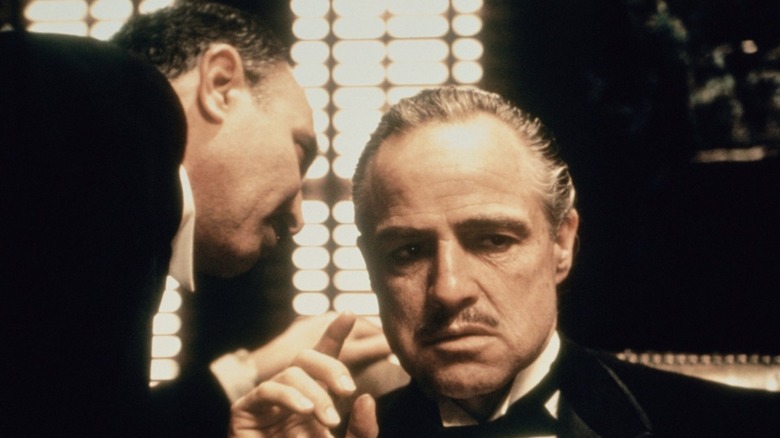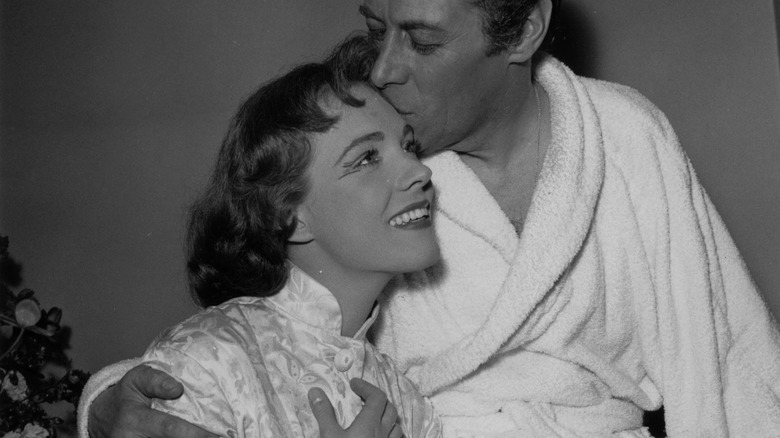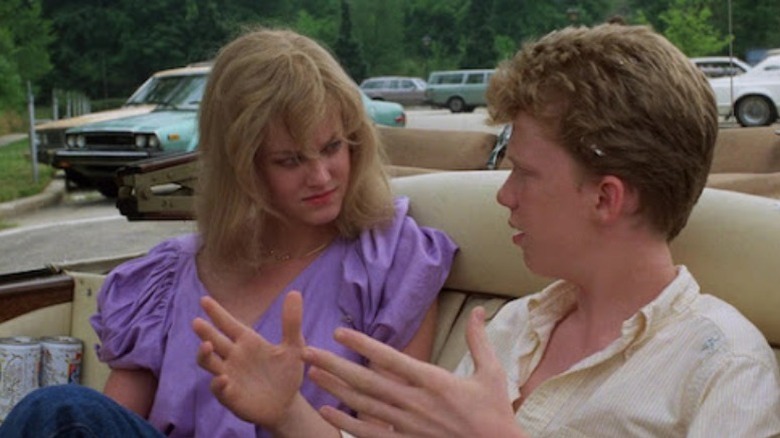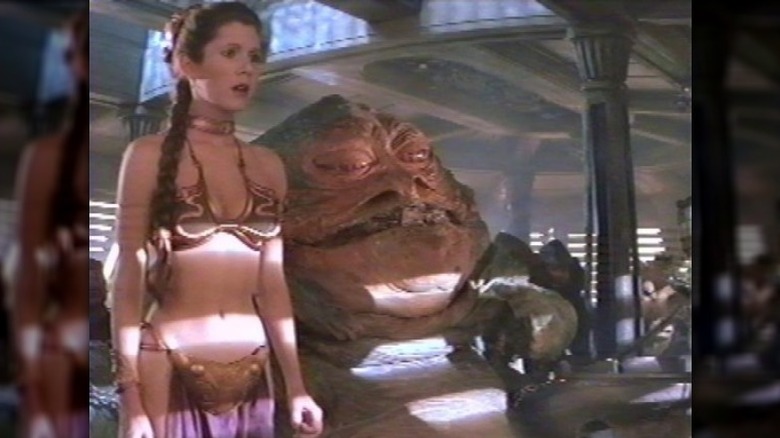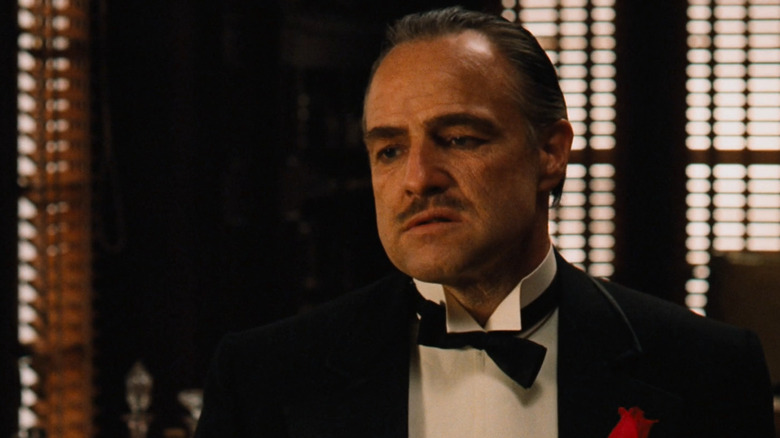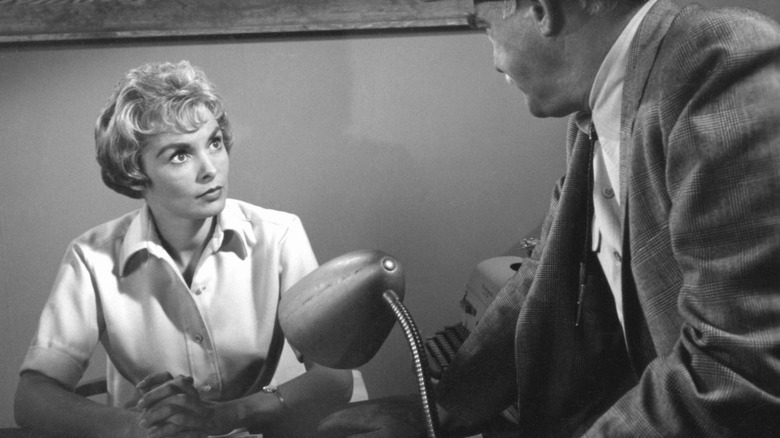Misogynistic Moments From Movie Classics That'll Make You Cringe Today
Classic movies often got away with a lot of misogyny that wouldn't fly if filmed today. Nowadays, we're so concerned with offending each other we compete to be the most "woke," particularly when it comes to the media we consume. No longer afraid to speak out if there's an ideological issue with the latest movie, TV show, song, we let everyone know about it.
The Force Awakens' Rey was (laughably) considered a Mary Sue by certain corners of the Internet because she had the gall to know how to fly the Millennium Falcon and major backlash ensued. The release of IT, the biggest horror movie opening weekend in history, brought with it a wave of think-pieces on whether Beverly was actually a victim of ingrained misogyny. Elsewhere, in conversation with Birth.Movies.Death earlier this year, Blade Runner 2049 director Denis Villeneuve stressed how important it was to ensure the female characters were more than ciphers this time around.
It hasn't always been this easy to pick and choose which media we consume based on the ideological concerns of its creators, or to complain when it doesn't fit the bill. And, when it comes to classic movies (itself a misnomer, since the word "classic" is open to interpretation), there are some real clunkers. The following are some of the worst incidents of blatant misogyny in classic movies.
Alfred Hitchcock movies
Alfred Hitchcock is widely regarded as one of the all-time greats when it comes to classic movies. He also has some serious mommy issues, especially if one takes Psycho, arguably his most well-known film, into account. As Bidisha put it for The Guardian, Hitch's female characters are loosely divided into "the vamp, the tramp, the snitch, the witch, the slink, the double-crosser and, best of all, the demon mommy" each of whom gets punished in the end (some more than others). Rampant misogyny exists in each of these otherwise classic films, from the aforementioned Psycho to The Birds and everything in between.
There's Marnie, in which Hitch employs "full-on misogyny, rampant woman-blaming and outright abuser apologism" to tell the story of a woman irrevocably damaged by her own mother, a prostitute and fellow psychopath. The Birds seeks to teach us a lesson about how women's inability to get along or find interests outside of pulling men(!) will eventually lead to pecked death by the titular creatures.
Elsewhere, both Pscyho and Vertigo feature duplicitous women out to screw men out of their fortunes, the premise of the latter even predicated on using the titular affliction against a (male) sufferer. Norman Bates is often taken as a character-insert for Hitch himself. Whether you agree with that analysis or not, there's no denying he's got some pretty bizarre ideas about women, and the poor, misguided menfolk they entangle in their web of deceit.
My Fair Lady
Back in 2016, while promoting a new stage adaptation of the play My Fair Lady, Dame Julie Andrews admitted that the show is "very, very sexist" but blamed the time period in which it's set. As with virtually every movie on this list, that isn't quite an explanation for the material, nor a defense of same.
The 1964 classic movie adaptation doesn't fare much better. It sees a "rough" young woman tasked with looking better and acting like a lady by a fancy English gent who uses her to solidify his own social standing. For the film's 50th anniversary, Charlotte Alter made a pretty compelling argument in TIME for the film to be taken as a tale of feminist empowerment. Her intentions are noble, but songs such as "You Did It" and "I'm An Ordinary Man" point to the misogynistic undertones, sometimes overtones, present not to mention the fact that Higgins doesn't change at all as a character from beginning to end.
As for that ending itself, it's perhaps the worst moment in the entire movie, undoing any good work from preceding events as Eliza goes back to Higgins, gladly giving up her autonomy maybe forever to bring him his slippers.
Grease
Regardless of how dearly you hold Grease to your heart, we can all collectively agree that its gender politics don't quite stack up, from Rizzo's reputation for being the town slut (which, to be fair, leads to arguably the best song on the whole soundtrack) to the T-Birds' constant ribbing on sexual relations only taking "15 minutes" and the nostalgia for outdated gender roles, there's a lot to unpack.
With modern eyes, the fact Sandy has to change virtually everything about herself (including her views on premarital sex) in order to snare Danny feels incredibly backwards. Sure, he must make certain alterations too (mainly in attitude and dress sense) but when Sandy emerges at the funfair it's to shocked gasps because, depending on what way you take it, she either looks way different or, more likely, way hotter. The weirdest part of her makeover is that, by all accounts, it isn't necessary. Sandy and Danny have just spent the whole summer together having a great time as themselves. Why does she suddenly need to change to fit in with his bad-boy high school persona?
Manhattan
Woody Allen's attitude toward women, or more accurately young girls, has been much discussed in the public arena. Though we might never know the truth about his personal life, judging the prolific filmmaker on his back catalog alone, the results ain't good. Manhattan is a stone-cold classic, boasting an early performance from a little-known theater actress called Meryl Streep and the coolest Diane Keaton ensembles since, well, Annie Hall.
It also boasts a dodgy premise that, 40 years later, has really not aged well, even real-life allegations aside. The movie sees Allen's middle-aged struggling comedian romancing a teenager whom he later dumps for Keaton's character (herself his best friend's mistress, so not the deepest characterization there, either) only to try to win her back in its final moments. By that stage, his young paramour has scored a semester abroad in London and is on her way there when Allen's Isaac catches up with her and begs her to stay with him. Infuriatingly, she is tasked with assuaging his fears about their time apart, as though her feelings are worth less than his, if they even come into the equation at all.
The Little Mermaid
It was easy to idolize Ariel as a little girl. A fiery redhead, she lived under the sea, had a wise-cracking crab BFF, and could do virtually anything she wanted. Including, essentially, beaching herself to spend time with a man she barely knew. Ariel's decision to go on land to be with Eric, thereby giving up her voice (in a pretty harrowing sequence), autonomy (since she was relying on him to take care of her), her family and friends, hell, her entire life, doesn't make as much sense once you've grown up a bit and had a few less-than-perfect relationships with bad dudes.
True, it wouldn't have been easy for Eric to go underwater to live with Ariel, but this isn't even presented as an option in the Disney classic The Little Mermaid. It's just a given that Ariel will compromise (read: surrender) everything she's known her whole life so the course of true love can run smoothly. At least the flick boasts a bad-ass female villain in the form of the terrifying Ursula. She'd never let a man steal her voice, let alone those lipstick-applying fish servants of hers (still holding out hope for this product to be made real).
Snow White
From one Disney classic to another, as we jump out of the sea and rush into the forest where some poor girl (or rather princess) is tasked with cooking, cleaning, and looking after seven horrible little men with self-reviewing names like Grumpy. It's not just that Snow White takes care of the dwarfs, it's how this idea is presented in the movie (as though it's her duty and hers alone).
There's also the overriding idea that The Queen hates Snow White because she's more beautiful and younger, meaning looks are more important than anything else. True, Snow White is shown to be good and kind, too, but first and foremost she's pretty and this drives The Queen into such a rage that she turns murderous. Given this was the very first Disney princess movie, it set a dangerous precedent that we're still grappling with today.
Sixteen Candles
This is a difficult one for those of us who grew up with John Hughes, worshiping characters like Ally Sheedy's Goth in The Breakfast Club and, well, everybody Molly Ringwald ever played. When it comes to writing strong female characters, Hughes certainly isn't the worst offender. It's in Ringwald's first collaboration with the director, though, where certain issues arise. In a post for the New York Post, Sara Stewart goes so far as to argue that Sixteen Candles is so racist and sexist she hopes any teen watching it nowadays "would view it as a shocking, old-timey artifact."
The main issue with the classic flick, maddeningly casual racism aside, is similar to Revenge Of The Nerds (see below): the normalizing of date rape. Sixteen Candles sees one young man passing his intoxicated girlfriend over to another and telling him to "have fun." After being plied with even more alcohol, the girl in question comes to and, instead of being confused/angry/scared, she reassures her date-rapist that she's pretty sure she enjoyed the night. He also takes her underwear home as a souvenir. As for her boyfriend? The hero, and most attainable, must-have guy in the movie.
Return of the Jedi
Possibly the most popular cosplay of all time, as worn by the likes of Adrianne Curry and so memorably sent up by Friends, also presents one of the biggest, and most contentious moments in Star Wars history. The scene when a bikini-clad Princess Leia is captured by Jabba The Hutt and restrained using chains was once seen as a moment of child-into-woman growth for her character. Nowadays, not so much.
Carrie Fisher, the iconic and dearly departed actress who portrayed Leia, described the bikini as what "supermodels will eventually wear in the seventh ring of Hell" in Newsweek (via The Telegraph). Further to this, the actress' well-publicized weight issues seem linked to series creator George Lucas's desire to see her in that particular costume. According to Fisher, he showed her sketches of the design to "frighten me into exercise." This knowledge, coupled with just how tiny the costume actually is, kind of puts the scene into a darker context.
Jaws
Much like Grease's Rizzo, the promiscuous, naked swimmer at the beginning of Jaws is punished for her sexual indiscretions not with an unwanted pregnancy but by being devoured by a hungry shark. The opening sequence is infamous, one of the greatest in horror history, and something most of us will have watched for the first time from behind the sofa, but the underlying message is that women who are impure, who flaunt their sexuality, deserve to be punished.
There's another argument to be made, in certain dark corners of the Internet, about whether the shark's wide mouth represents a vagina, but the less said about that the better. Simply put, this is a man's movie, for manly men, with three, rough 'n' ready dudes at its helm venturing out to sea to save the day while the women are left to wait anxiously onshore for them or rush out to fret when their sons are taken. Thankfully, Spielberg eliminated the weird marital affair plot from Peter Benchley's original novel, or there would be an entirely different, anti-women slant to this otherwise brilliant classic film.
James Bond movies
This one is a bit of a no-brainer. Although the series has reached new heights with blonde, easily bruised modern Bond Daniel Craig (who shocked nobody by signing on again for another round), there's no denying a franchise with a character unironically named Pussy Galore has a fairly tenuous understanding of what constitutes a three-dimensional female character. As far as Bond is concerned, woman are disposable.
From approving of Mary Goodnight's tight-in-all-the-right-places frock to telling Anders he didn't recognize her with her clothes on (both from The Man With The Golden Gun), to the entire characterization of Xenya Onatopp as so horny it makes her quite literally want to kill everybody, Bond isn't exactly known for having a responsible attitude to the portrayal of women onscreen.
The most egregious example of the super-spy's attitude to the fairer sex might be From Russia With Love's out-of-nowhere butt slap, which seems to say nothing besides, "I am the man, I am in charge and I will touch you whenever I see fit." In Goldfinger, meanwhile, a similar slap is followed up with an order to leave because the "men are talking." Charming.
Gone With The Wind
This 1939 classic romance is back in the news again thanks to its rampant, unabashed racism. Gone With The Wind is also a far less feminist tale than certain corners would have us believe. For starters, although Scarlett is presented as a tough woman who will do anything to survive, much of that "anything" involves using her feminine wiles.
Scarlett is presented as vain, selfish, and ultimately doomed. Unlike Melanie, her best friend and a paradigm of the right kind of femininity, who dies a noble death, Scarlett ends up alone, such is her fate. The issue is that the film is torn between loving Scarlett's gumption and punishing her for it. Scarlett O'Hara is never really the heroine of her story because the society in which she exists will not allow her to be. This is never made more clear than when Rhett tells her she "needs kissing badly" and that ought to sort her out. Would that life were so simple.
Revenge of the Nerds
Revenge Of The Nerds is a cult classic that frequently courts retrospective screenings in some of the coolest art-house cinemas around the world. It's also majorly problematic. Revenge Of The Nerds' misogyny has to do with a fairly dodgy date rape sequence. And, echoing Sixteen Candles, here the perpetrator isn't the obvious jock but one of the titular nerds. As William Bradley argues for The Mary Sue, there's an ingrained idea that we can trust the quiet, shy loser because, we assume, he won't have the same sense of entitlement as a bro (recent real-life events would suggest otherwise).
The sequence in question sees nerdy Lewis steal popular jock Stan's Darth Vader mask so he can trick his girlfriend Betty into having sex with him. Bizarrely, when Betty discovers the truth she isn't horrified but instead almost immediately falls for Lewis. The two even end up married in a sequel. It's a dangerous message to give young men, because it takes the woman's choice completely out of the equation. Basically, these movies tell male audience members to just go for it no matter what you have to do and that she'll just be grateful afterwards. Dangerous, never mind dumb.
Casablanca
Another of the most romantic classic movies of all time that, sadly, isn't quite that romantic. First off, the grand ending is based on a man deciding how a woman should live her life and who she should be with. That's not to say Ilsa makes the wrong decision. She doesn't make the decision at all; it's made for her.
Sure, Ilsa is fighting throughout the movie to be with her husband and reject Rick's advances, but it's only when he makes his big speech that she's given clearance to do what she wants. She even outright tells Rick at one point, "You'll have to do the thinking for us."
It's also worth pointing out that there are only three female characters in Casablanca; Ilsa, who needs men to think for her and whose chief characteristic is her beauty, Annina, a young woman willing to sleep with someone for a Visa, and Yvonne, whose main use is sex, like a James Bond cipher with even less depth. Regardless of whether Ilsa's big, self-sacrificing moment is even her choice, it's still vastly overshadowed by Rick's grand romantic gesture. Just to be clear, Rick's reassuring her that it's okay to stay with her own husband.
The Godfather
There are three movies favored by ghastly, self-confessed men's right's activists the world over: The Matrix (the origin of the dreaded "red pill"), Fight Club (self-explanatory), and The Godfather, a movie that should someone, male or female, deign to criticize it, a man will spontaneously appear to explain just how wrong he or she (usually she) is. The Godfather isn't really sexist, he'll say, it's simply about a sexist society. Duh.
That's all well and good except for the fact that the patriarchal society on which the entire premise is based rarely, if ever, comes under attack from virtually any of the characters onscreen. It's assumed, in much the same way as Gone With The Wind hearkens back to the glory days of the Confederate South and Grease reinforces traditional gender roles, that things are better when men are running the show. One of the most famous quotes from The Godfather is "may their first child be a masculine child!" This declaration is seen as a moving, emotional moment between two characters.
Stuck in the past
It can be difficult to parse our love of classic movies with our strongly-held desire for female equality, but the times are changing. Slowly, but surely, the lessons of the past are being learned by those in power. Villeneuve's Blade Runner 2049 is just one example of somebody in charge of a huge, blockbuster movie taking into account everything that's come before, as well as the demands of a modern, intelligent, and discerning audience.
As it stands, we should continue to appreciate classic movies for what they are, what they achieved, and how they were judged in their own time, along with questioning those moments that don't quite sit as well with us anymore. Without looking back, there is no real room for growth.
